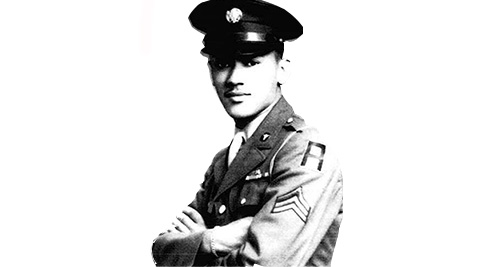WASHINGTON – Black nothingness.
For hours, that was all that Army Cpl. Waverly Woodson, Jr. recognized as the landing craft rode the choppy English Channel on a moonless night.
The prospect of living was uncertain. But “Woody” Woodson, a medic for the 320th Barrage Balloon Battalion – the only all-black U.S. combat unit to storm Normandy’s beaches on D-Day – was willing to risk his life for a country that treated him as a second-class citizen.
The morning dawn on June 6, 1944, illuminated Normandy’s distant shoreline. Squinting at the serene beach that would soon be called “Bloody Omaha,” Woodson found solace and satisfaction.
His moment of reverie, though, would be short-lived. In a matter of minutes, a hailstorm of German bullets and bombs would spray the English Channel and the coastline would be awash in bobbing, lifeless bodies.
Woodson would end up saving as many as 200 soldiers during the Allied assault on German positions. His heroic efforts earned him a Bronze Star – and a recommendation for the Medal of Honor.
But he never received the medal.

Photo source: Joann Woodson
More than 70 years later, Rep. Chris Van Hollen, D-Kensington, wants to right what he and others see as an injustice.
On Tuesday, the lawmaker wrote a letter to Acting Secretary of the Army Eric K. Fanning urging the military to award a posthumous Medal of Honor to the World War II veteran, who died in Clarksburg, Md., in 2005.
“As a result of his heroic actions on D-Day, Woodson was recommended for the Medal but never received it,” Van Hollen stated in his letter. “As you know, no African Americans received the Medal of Honor for their heroism during World War II.”
President Bill Clinton in 1997 awarded seven Medals of Honor to African American veterans of World War II, only one of whom was still alive.
Woodson’s story received new attention in a recent book by Linda Hervieux titled “Forgotten: The Untold Story of D-Day’s Black Heroes, at Home and at War.” Van Hollen pulled excerpts from her book in his letter.
“It is very gratifying that (the congressman) thinks it’s a cause worth fighting for,” Hervieux said. “It was appalling that (Woodson) never got acknowledged for what he did.”
On that June day in 1944, Woodson’s landing craft hit two submerged mines. The explosion’s impact blew out the vessel’s motor.
The medic hunkered down on the craft’s deck as a shell exploded near him. Shrapnel sliced open Woodson’s leg and groin.
Seriously wounded and with no time to spare, he followed a tank that rolled off the landing craft as the battalion made a bee-line for Omaha Beach, hauling 125-pound barrage balloons that served as protection for allied troops from low-flying enemy aircraft.
Under rapid fire from German gunners, Woodson created a makeshift medical station and rescued hundreds of soldiers, according to later military reports. The medic resuscitated multiple, nearly-drowned troops, dressed gaping wounds and even amputated a foot in a rescue effort that lasted for 30 grueling hours until he collapsed.
For his valor, the U.S. War Department sent a memo to President Franklin D. Roosevelt suggesting Woodson as a candidate for the Medal of Honor.
“Here is a Negro from Philadelphia who has been recommended for a suitable award,” the memo read. “This is a big enough award so that the President can give it personally, as he has in the case of some white boys.”
Interviewed for the 50th anniversary of D-Day in 1994, Woodson said of his exploits: “There is no hero. It’s just that you’re there and you do what you can.”
In 1997, the ex-soldier explained to U.S. News & World Report that the Army he served was “totally segregated” and “the feeling was that blacks were inferior to whites.”
“Four or five of us were recommended for higher honors, but we didn’t get them,” he told the magazine. “Our white superiors recommended us but the War Department didn’t approve it. Silver Stars and Congressional Medals of Honor did not go to black officers or black enlisted men.”
Van Hollen, along with Woodson’s wife, Joann, who currently resides in Clarksburg, are continuing the fight.
“I think he has a very good shot of getting it,” said Hervieux.
The Army did not comment specifically on the Woodson case.
“We do not talk about individual cases that may be under consideration for the Medal of Honor while they are under review,” said Wayne Hall, an Army spokesperson.


You must be logged in to post a comment.